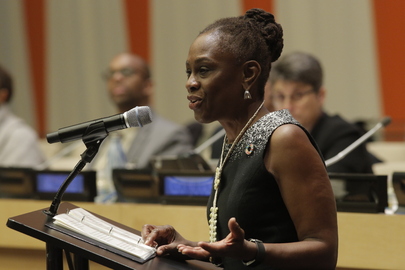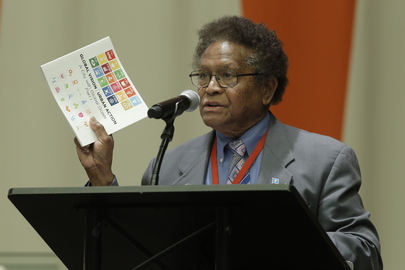The event highlighted New York City’s innovative approach to tackling mental health against the backdrop of the 2030 Agenda for Sustainable Development and shared best practices from countries and cities around the world. One of the innovative solutions established by NY City is ThriveNYC launched in 2015. Thrive NYC is a package of initiatives costing $850 million over four years that links action at local level with the 2030 agenda, and illustrates how NYC aims to meet all the SDGs though activities focused on health, the environment, etc.

Chirlane McCray, the first lady of New York, shared the city’s recent experiences in implementing its new mental health agenda. She highlighted that one in five Americans struggle with mental health problems, substance abuse or both, New York not being an exception. The city has addressed this with several actions such as, increased the number of institutions treating mental health patients and number of mental health professionals and shifting tasks from health care professionals to other community stakeholders such as teachers and workplaces to ensure there will be enough health care professionals to respond to mental health needs. This has seen an 80 percent increase in treatment of postpartum depression in city-run hospitals and the Maimonides Medical Center in Brooklyn.
Ambassador Dessima Williams, Special Adviser for the implementation of the SDGs in the office of the President of the UN General Assembly, stressed the interconnection of the SDGs and the need to prioritize the implementation of the health goal because there is no action without health. She mentioned important recent events that addressed mental health such as the World Innovation Summit for Health held in Qatar and the Universal Health Coverage day event hosted by WUN. Ambassador Caleb Otto of Palau spoke about the importance to discuss mental health more widely in order to reduce the stigmas, and to treat mental health disorders like any other disease. Richard Buery, NYC Deputy Mayor for Strategic Policy Initiatives underlined that mental health problems also lead to major economic losses and decreased safety. The key is to expand service availability and bring them closer to people, in collaboration with local communities. New York City has launched a project that enables obtaining a certification for “mental health first aid” and will send invitations and more information on such training to Permanent Missions in the coming weeks.

Caleb Otto, Ambassador of Palau to the United Nations
The expert panel included Dr Gary Belkin, NYC Executive Deputy Commissioner for Mental Health; Ana Bermudez, Commissioner, NYC Department of Probation; Dr Sidney Hankerson from Columbia University; Anna Ortega-Williams from Red Hook Initiative and Dr Kishor Malawade from Maimonides Medical Center. They discussed how health systems can better partner with other stakeholders and address the growing needs for care. Dr Malawade said that it is crucial to redesign health systems to respond to the needs and new modes of mental health care and this should start with engaging patients and health care providers in the primary health care setting, and to include behavioral- and mental health promotion and treatment. Commissioner Bermudez noted that the criminal justice system in its current form does not promote mental health goals but the opposite - it creates stigmas and intensifies existing health problems. NYC City Department of Probation is working on shifting the perspective from isolation of criminals to improving their well-being. Dr Hankerson stressed that young mental health patients need to be approached in their own language and level, otherwise messages do not reach them. He also provided examples of partnership with faith based organizations and how church communities are establishing mental health support groups for their members and communities.
Several UN Member States took the floor to share their perspectives and mental health initiatives. Canada flagged that mental health is a national priority for the Prime Minister and that they had launched several programmes including collaboration with Bell telecommunication company that donates 5 cents to mental health care from every text message with the hashtag #let’s talk. Costa Rica noted that it is necessary to provide treatment and alternative solutions to the large populations with mental health disorders. Chile underlined mental health care as a solid part of the right to health. Belgium shared their experiences of piloting new community-based health care programmes for adults that are easily available, invest in early detection, and rely strongly on community health networks. If successful, the programme will be extended to include children and older people.
